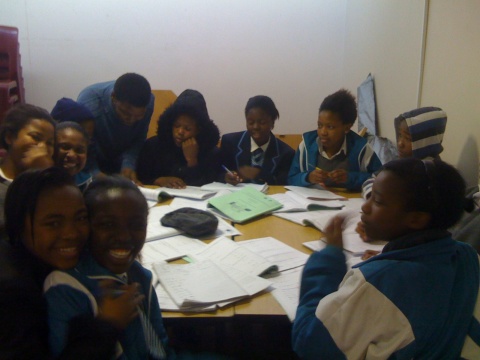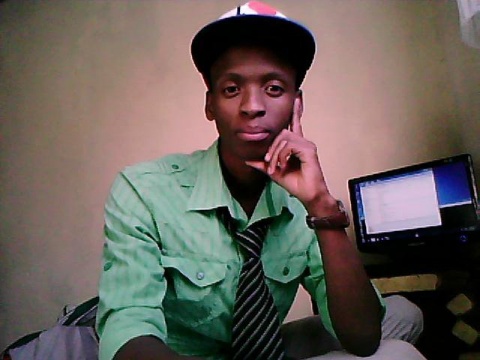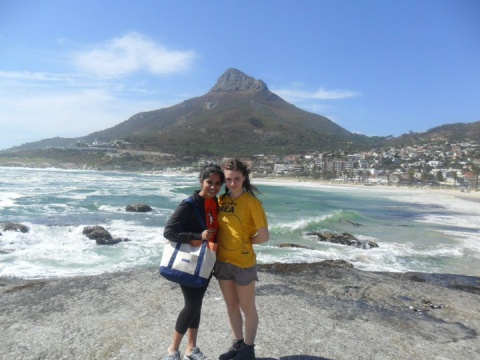I am currently about to start my third year at Amherst College a small liberal arts college in Western Massachusetts in the United States as a Black Studies and Women and Gender Studies double major and German as my language focus. This is a completely different path to the original plan I had in high school, which was to study accounting and eventually become a Chartered Accountant. I was fortunate enough to receive a scholarship from the Student Sponsorship Programme (SSP) in high school and SSP played a large role in my being where I am today not only for financial reasons but through help with University applications, career guidance and personal support. SSP also influenced my interest in working with the Center for Community Engagement (CCE) at Amherst College because even though I have a busy schedule as a fulltime student, I think it is important to help out where you can. Once I week I tutor at A Better Chance (ABC) a national programme that takes young boys from disadvantaged backgrounds and puts them in some of the best high schools in America. Every summer, the CCE and other departments at Amherst provide a stipend for students to go to any country in the world and intern with any community-based organization. I wanted to do something in South Africa so that I could be home and still do something productive during my school vacation and more especially work with an organisation with a focus on education and/or youth development. Thankfully we live in a technological age so I just googled the type of organisations I was interested in working with, found IkamvaYouth Gauteng within the Siyakhula Education Foundation, emailed them stating my interest in working with them and the rest is history.
I have to say, for the name SEF has made for itself, the organization is quite small. I expected the Siyakula and IkamvaYouth staff to be more than twenty people but they do not even reach ten. I was really nervous the first day I arrived but I think due to the size of the people working at SEF there is a certain bond shared and I felt comfortable in no time. One of the first chats I had with Andrew Barrett, he told me that with Education in South Africa, however bad you think it is, it is actually much worse. One of the most powerful things he told me though is the fact that 80% of South African schools are basically write-offs and it would make no difference whether they were open or closed. That struck me very much because even though I was raised by my mother as a single parent who was also the only one out of her five siblings with a stable job, I managed to go to one of the best schools in East London, Clarendon High School for girls and passed matric with four distinctions. Sometimes you become very closed off to other environments and don’t realise the extent of the inequalities that exist out there. A country like South Africa that is only in its 17th year of democracy is a great place to study the gender and racial inequalities that exist because seventeen years in not enough time for the results of the restitution policies implemented to be visible.
I attended the IkamvaYouth Careers Indaba today, June 25, 2011 and met the IkamvaYouth students for the first time. I am extremely excited to be working with all of them for the next few weeks and making a difference, however small in their lives


IkamvaYouth and EwB joined hands to build future Mathematicians. Knowing that pass rates are low in mathematics at grade 12, a closer look has been taken to understand why learners perform so badly in maths. One of the major points that came up is the foundation of mathematics; maths is like ladder: you can’t jump one step and expect not to fall. Without understanding grade 8-level maths it makes it difficult to fully grasp grade 9 maths and the chain continues to grade 12. For example, with some learners, it’s not that they don’t understand the trigonometry, but it’s the fraction within the trigonometry with which they’re struggling and leads them to get the math wrong. Yes We Can Maths provides the platform to understanding these basics through the yellow and green books at grade 8 level; they start at the basic core of mathematics Addition, Subtraction, Multiplication and Division. From there the books provide opportunities for learners to practice applying all of those skills to complex maths like fractions, exponents, etc.
This being basic mathematics, most learners they don’t think they need it due to the use of calculators. However, once one starts to challenge learners about how much they are depending on calculators, they realise that they don’t even know the methods of solving simple multiplication. Through this project we are tearing down a fundamental problem of mathematics education in South Africa.
Some highlights and challenges from the learners’ perspective, we asked couple of questions: How do they feel about the books? Is there anything would like to change about the class or tutor? And do you think the books are helping in your school work?
“To me the books are not easy at the same time not it’s not difficult, because some of activities are easy but some of them it’s hard to understand so I am in between.”
“There is nothing I want to change about the class it’s alright and my tutor Nicholas does a perfect job.”
“It was helping on term 1 but now it does not, because now we are doing equations in school and that book it’s no fractions so it’s not helping much. I would like the book to change to book 2 to have equation solving for x, expression and exponents”
“I feel very excited when I see the books, it’s because it helps me very much. It’s easy to understand all the equations in the book.”
It has been wonderful having these grade 8 learners join IkamvaYouth. In addition to the EWB project they have also been exposed to English tutoring and the full range of holiday programme activities.
Thank you to EWB for enabling us to work with these learners.

The much-anticipated 2010 Annual Report is out!
A huge thanks to volunteers Lynne Stuart for the very beautiful design and layout, and to Julia de Kadt for proofreading.
The Report is a multi-media feast, with links to blog posts and youtube clips throughout. Take some time out to learn more about IkamvaYouth and the ikamvanites’ remarkable stories of 2010, share the links you like and enjoy!


I am one of the volunteering tutors for IkamvaYouth in Maths and Science at the Makhaza branch and ever since I started helping out, which was about feb 2011, I have been enjoying every moment of it, absolutely have no regrets about nothing. One of the many reasons I devote a lot of my free time to helping these HighSchool children with their studies is because I was once a student in a disadvantaged school myself and I know what it’s like to have your dreams faded out by lack of study material or enough qualified teachers for science subjects, at the same time not affording Saturday classes and extra lessons. This can really make a student’s life difficult, and so I have decided to help the disadvantaged youth in any way I can academically and ikamvayouth is a good way of achieving that. I believe that without the youth, there is no tomorrow, and without educated youth there is no better tomorrow than today. We should all invest in their futures, not only for their sake but for the sake of humanity as well. I am also glad to have gone to my first SPW where me and other tutors had lots of fun collaborating with the most committed students in coming up with ideas to improve IY, during which I was given the opportunity to help out in other parts like the BranchComm, serving as the head of Operation Fikelela and also helping out with the administration of the ikamvayouth computer lab, along with some brilliant IY students who have a big interest in IT. There’s nothing better than somebody to look at you and say you’ve change their lives, and it’s just a privilege to teach these kids.


Name: Nisha
Where are you from? I’m from Georgia, in the United States.
How did you hear about Ikamva? Veronika and I came to South Africa with a college class in March and met with some of the learners then.
What were your favorite subjects in high school and why? I really enjoyed English, because I love reading.
Name: Veronika
Where are you from? I come from a small village in the south of the Czech Republic.
What were your favorite subjects in high school and why? I loved studying Czech history because it helped me understand my country and its people a lot better.
We’re looking forward to working with all of you for the next 5 weeks! We’re now busy planning for Winter School—its going to be awesome 🙂

The Social Entrepreneurship class of 2010 (SECP2010) recently graduated from the Gordan Institute of Business Sciences (GIBS) and among the graduates was IkamvaYouth’s Gauteng Coordinator Andrew Barrett.
What’s more, Andrew’s Action Learning Project (ALP) about “Scaling IkamvaYouth” was awarded best ALP for 2010. An executive summary of this report is listed here and if you are interested you can download it at the bottom of this article.

Andrew Barrett congratulated by Prof. Nick Binedell for best ALP on GIBS SECP 2010.
Executive Summary:
IkamvaYouth is remarkable not just in what it does but also in how it does it and central to the success of the IkamvaYouth model (so far) is the grassroots democratic emphasis that provides all IkamvaYouth stakeholders (i.e. the learners, coordinators and volunteers) with the tools to actively influence and shape their organisation.
This introductory report focuses on the challenge of scaling IkamvaYouth to achieve maximum impact while honouring the values that IkamvaYouth believes in.
In looking for solutions to this challenge there are a number of interesting examples in the theoretical literature of alternatives to a traditional (hierarchical) top-down approach and of particular interest is the fascinating Brazilian for-profit company, Semco. The democratic workplace environment espoused by Semco and the impressive results it achieves provide practical pointers of a possible way to locate power and control in the IkamvaYouth structures that will remain true to its grassroots origins.
One potential solution to the IkamvaYouth scaling challenge is to franchise the IkamvaYouth model in a way similar to that done by Habitat for Humanity and in so doing ensure that power and control remain vested at the local branch level with autonomous structures pursuing the key IkamvaYouth objectives in a way that maintains IkamvaYouth’s impressive results within a pre-defined IkamvaYouth framework.
It also appears that pursuing a non-hierarchical approach means that a type of servant leadership is inevitable and, further, that a value-based democratic organisational structure seems to offer a highly attractive option that fits this bill. It seems certain that considerations of this kind would have multiple implications for the structuring of the organisation but perhaps the most fundamental movement required is a mind-shift away from the mainstream traditional hierarchical worldview in exchange for an approach that better reflects the integrity of IkamvaYouth as a truly grassroots organisation not only in name but in structure as well.
Click here: for the full report.











 Lloyd Lungu
Lloyd Lungu